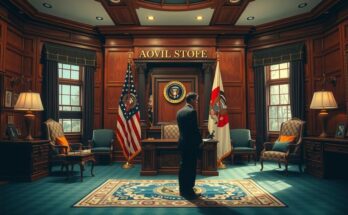Over 200 Bolivian soldiers are reportedly held hostage by supporters of former president Evo Morales, who are blocking roads to prevent his arrest. The military claims that armed groups have taken over barracks, causing escalated tensions. While some activists deny that soldiers are hostages, retired military personnel argue otherwise, citing lack of support and intelligence leading to the conflict. Investigations are expected to determine accountability in the unfolding crisis.
The Bolivian government reported that over 200 soldiers are being held “hostage” by supporters of ex-president Evo Morales, who are actively protesting to prevent his arrest on serious charges. The situation escalated in the Chapare region, where demonstrators not only blocked roads but reportedly seized military barracks, allegedly “kidnapping” military personnel and cutting off essential supplies. The military confirmed that armed groups had taken over facilities in Chapare, prompting concerns over the safety of personnel within and the extent of the government’s control in the area. Vicente Choque, leader of the Indigenous federations in Chapare, disputed claims of hostages, stating that soldiers could exit the barracks if coordinated with protesters. Tensions arose after Morales accused state agents of an assassination attempt against him, leading the protest groups to defend their actions against military presence, which they associated with that threat. Meanwhile, Omar Duran, a retired army officer, reinforced the belief that the soldiers were being restricted from leaving and were effectively hostages, despite the government’s firm stance. In an analysis of the incident, Duran suggested a significant failure in military intelligence and preparedness contributed to this crisis. He criticized the military’s lack of support and resources, leading to their hesitance in confronting the protestors. The Deputy Minister of Coordination with Social Movements indicated that investigations would take place to address the circumstances that led to the occupations of military facilities, emphasizing the need for state accountability in maintaining order and security.
The backdrop of this volatile situation lies in Bolivia’s political landscape, heavily influenced by Evo Morales, who served as president from 2006 until 2019. Morales’ return to politics, particularly as tensions mount around his criminal allegations, has galvanised his supporters while provoking opposition. The government of President Luis Arce, once an ally of Morales, finds itself entangled in a conflict where demonstrators are willing to take militaristic action to protect a figure associated with their rights and identity. The broader implications of these actions raise questions about the stability of the current administration and its capacity to manage civil unrest. The Chapare region, regarded as Morales’s political bastion, presents a unique challenges with its Indigenous majority often taking action to assert their demands. The protest group asserting that they are not holding soldiers against their will further complicates the narrative of hostage-taking, raising crucial ambiguities regarding the definitions of freedom and restraint within the context of political activism in Bolivia.
In summary, the situation regarding the 200 soldiers reportedly held hostage in Bolivia highlights a complex intersection of political allegiance, civil unrest, and military authority. While dissenters assert they are engaged in a legitimate protest against perceived threats to their leaders, key military figures emphasize that troops face limitations akin to being held captive. This episode underscores the critical need for effective governmental oversight and a reevaluation of military engagement protocols in response to public demonstrations in Bolivia.
Original Source: www.kgwn.tv




